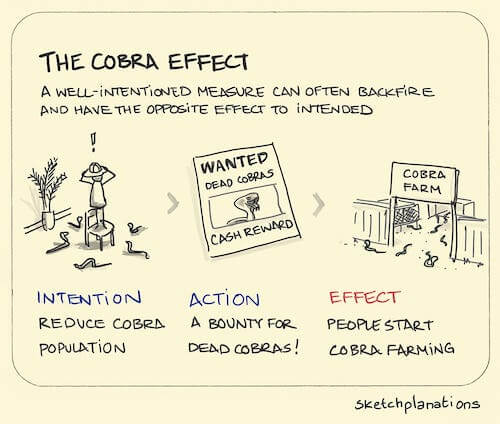
Today let me talk to you about cobras, selling cheap steaks, and so how to address perverse incentives.
The cobra effect
First, the cobra effect story as illustrated by Sketchplanations above and for their full story, visit the link below the picture.
I saw this in reading George Mack‘s latest “clouds and dirt” email, where he shared the image and wrote his thoughts:
When a measure becomes a target, it ceases to be a good measure.
The Cobra Effect is the perfect example of incentives that backfire.
There’s a famous story of British colonialists trying to reduce the snake population in India.
They offered bounties for dead cobras with cash given out to the killers.
The incentives back-fired…
The local population started breeding cobras & killing them.
When the government discovered this, the reward programme was scrapped.
The cobra breeders then released their $0 snakes into the street, making the problem much worse.
Andy Grove (Former Intel CEO) has a specific tactic to prevent this from happening: Pairing Metrics.
To prevent one metric leading to perverse incentives, have the opposing metric as a goal too.
For example, Keith Rabois will measure fraud rate AND customer service in his business.
If his customer service team was solely optimised around fraud rate, they may achieve the objectives but treat every customer like a potential fraudster. (Resulting in awful customer service)
Stop selling cheap steaks
Many years ago I was responsible for a restaurant, but wasn’t directly involved in the day to day, simply responsible for the commercial results. I used to look at the daily revenue snapshot, and at one point I noticed they were booming on certain evenings midweek. It turned out that the restaurant manager was filling up midweeks by offering crazy low pricing deals on steaks. At the same time he was also doing the same with alcoholic drinks.
The result was that the average revenue on those evenings was around double what it had been before, but they were selling top quality steaks super cheap. What is more, they couldn’t even upsell higher margin items as they were discounting the drinks too.
The net commercial result of this was that the restaurant was making less money than before, even though revenue was nearly double. Now, instinctively you might question that, until I tell you that the restaurant manager had a bonus clause in his contract that kicked in when he hit certain revenue targets, so once we paid that out, the already wafer-thin margins, allied to the low revenue per customer pushing staff costs up as a percentage. Well, you can see how this worked really well for the restaurant manager, but not for the restaurant ownership.
Perverse incentives
The cobra effect is an example of perverse incentives. George Mack’s story around Andy Grove showed one way to address this potential unintended issue
What happened with the restaurant? I realised that the restaurant manager was incentivised on revenue, whereas the restaurant owners only incentive was around profit. All I did was to change the incentive measurements for the restaurant manager from the top line to the bottom line. After that I was even more “hands off” as their incentives were truly aligned to that of the owners of the place.
